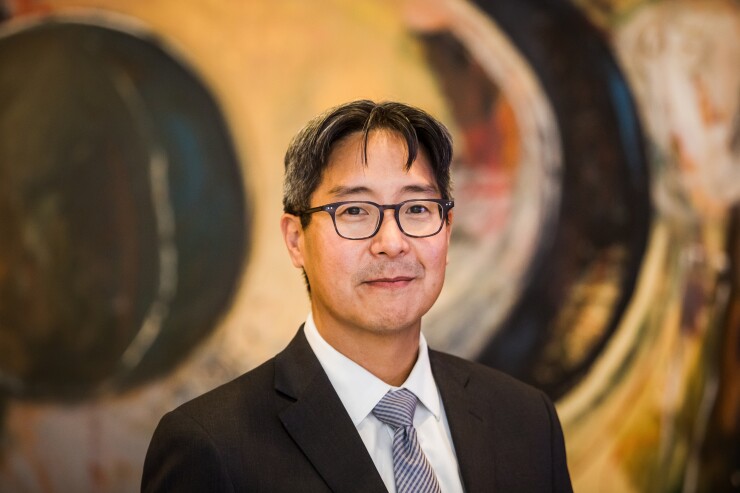WASHINGTON — Acting Comptroller of the Currency Michael Hsu is developing a reputation as a skeptic when it comes to emerging products like cryptocurrency.
He suggests it's not because he is opposed to digitally focused solutions. Rather, he says, regulators are rapidly trying to take stock of once-esoteric products that are quickly becoming mainstream.
“This is now consumer-facing,” Hsu said this week in an interview with former American Banker editor in chief Rob Blackwell, now the chief content officer of IntraFi Network. “We've got regular people who are in this product, who see hope in this product, and this space is not regulated.”
Hsu, who took the helm of the Office of the Comptroller of the Currency May 10, has taken a more cautious approach to crypto and fintech compared to his predecessors at the agency.
Under his leadership, the OCC along with the Federal Reserve and Federal Deposit Insurance Corp. have set up an interagency “sprint” team to examine digital assets, with the goal of coming up with a joint framework for supervision.

Hsu, who was interviewed for the
“There's a part of me that sympathizes with why these populations are getting into crypto, because I think there's a distrust of finance,” he said. “There's a distrust of banking, and times are tough, and so I think there's a hope that's provided by crypto. But that hope right now is very nascent. It's quite underdeveloped.”
Forming a more developed regulatory approach and providing clarity for banks with their own questions about crypto are among the objectives of the interagency "sprint" team. Hsu said the effort is intended to help define digital assets and the potential risks that they might pose to both consumers and financial stability.
However, he suggested that the three agencies may not all come to the same conclusions.
“We may end up diverging on the actual policy outcomes because we're each independent agencies, but at least we're speaking [and] we're not confusing each other with how we're talking about it,” he said. “Because if you go out into the world now, you know, what is a virtual asset? There's like 10 different definitions of virtual assets. It's not very constructive.”
Hsu also suggested that the OCC might look into buy now/pay later products, which the Consumer Financial Protection Bureau has also
“When it's at its best, I think it's a good product, but the percentage of people who basically don't meet the original terms of the payment is very high,” Hsu said. “That's not the sign of a responsible product, so these are things we all have to think about.”
The OCC is also conducting a review of bank overdraft policies, which Hsu said can “contribute to the perpetuation of inequality.”
“It's expensive to be poor, and I think overdrafts are one example of that,” he said.
But he also noted that there is “healthy innovation” occurring in the overdraft space to address the problem.
PNC Financial Services Group in April
“Almost mathematically, it's less revenue for the banks. I think that that's OK,” Hsu said. “If that's what it takes to kind of get to a healthier product, then that's what it takes.”
Blackwell also pressed Hsu on the agency's review of initiatives spearheaded under prior OCC leaders to offer fintech firms with specialized chartering options. Those efforts have drawn criticism from some corners, including state regulators who have mounted legal challenges to the agency's special-purpose fintech charter. To date, no firms have been granted such a charter.
“We need to level the playing field [and] we need to contain the shadow banking system. These two things I believe very strongly in. Chartering decisions need to fit in with that strategy,” Hsu said. “What is the strategy for achieving those two things? Chartering is clearly part of that, but it's not a solution in and of itself.”
“When we finish the review, and I come out with decisions on these, it will be with those two goals in mind,” he continued. “Basically, the sub-bullets of those goals [are] avoiding regulatory arbitrage in races to the bottom.”
The 2008 financial crisis is front and center in Hsu’s mind in considering how to approach things like the fintech charter, he said.
“I think the global financial crisis can be traced in part to a very inconsistent and porous perimeter,” he said.
Leading up to the crisis — and similar to today, with emerging technologies like crypto — there were “a lot of institutions outside of the bank regulatory perimeter doing things that banks were also doing” but operating under different standards, Hsu said.
“You had this very kind of patchwork system, which allowed a lot of these vulnerabilities to grow to very just unmanageable sizes,” he said. “I think there's some risk of that today, and the best antidote I can think of is that we as the agencies attack them together.”





